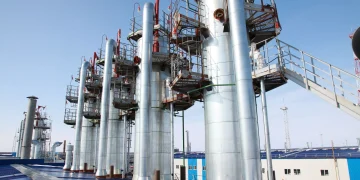New Technologies have Allowed Mining Companies to Reduce the Burden on Nature
It has always been believed that oil and gas production is a “dirty” business and a priori cannot be environmentally friendly. However, with the development of new technologies and their introduction into the raw materials industry, the situation is beginning to change, and more actively than it might seem at first glance.
According to a study conducted by the International Energy Agency in 2021, the oil and gas industry accounts for 60 and 40 percent, respectively, of emissions of various pollutants into the atmosphere. Contrary to the global desire to abandon traditional energy sources in favor of renewable ones as soon as possible, oil and gas will remain the main sources of energy for all mankind for a long time to come. However, this does not mean that, while remaining among the leaders, oil and gas companies will continue to “smoke in black.” The industry has already begun to actively change, introducing technologies that help to conduct mining activities with less impact on the environment.
The starting point that forced mining companies to embark on the path of environmental responsibility was the Paris Agreement, adopted in 2015. According to the document, it is necessary to take measures that will keep the increase in the average global temperature below two degrees per year, as well as allow the transition to low-carbon development.
189 countries, including Russia, have joined the Paris Agreement. All participating countries have set themselves the goal of reducing emissions of carbon dioxide and other greenhouse gases into the atmosphere. About 70 countries have declared that by 2050 they will be able to achieve carbon neutrality, that is, the volume of carbon dioxide emissions will be equal to the volume of its capture and absorption.
In addition, in our country in 2021, the Strategy for the socio-economic development of the Russian Federation with a low level of greenhouse gas emissions until 2050 was approved. Its goal is to achieve carbon neutrality by the stated deadline, while maintaining sustainable economic growth. Legislative changes were also adopted, according to which, from this year, all enterprises with emissions of more than 150 tons of CO2 equivalent per year must submit carbon reporting.
In addition, companies are actively developing their own environmental strategies, implementing technologies and carrying out activities that minimize their carbon footprint. According to Expert RA analysts, so far only 14 percent of companies have long-term climate projects under implementation. Leading Russian mining companies also have environmental strategies.
“Globally, the pioneers of the ESG transformation, which began several years ago, were just large manufacturing companies,” explains Ksenia Kasyanova, Director of Research and Development at the Public Relations Development Company (CROS). “They all used this agenda both to attract investment and to communications. In particular, many extractive companies in Russia are city-forming, they have close ties with local communities and regional authorities. And for these audiences, the environmental agenda is really important.”
Thus, one of the leading domestic oil companies announced that, according to the internal corporate development strategy, it plans to achieve carbon neutrality by 2050. To do this, by 2030, the company intends to reduce the intensity of methane emissions to below 0.2 percent. To achieve this goal, it is planned to transfer its own transport to low-carbon fuels. In addition, develop gas filling stations and charging stations for electric vehicles. There are also plans to produce jet fuel with a reduced carbon footprint. In the field of oil refining, the task is to focus on the production of light oil products, which are considered cleaner. According to experts, this strategy is not an isolated case, but a trend among large mining companies.
Companies are actively implementing drilling technologies that increase productivity and minimize environmental damage
In addition, today oil companies are actively introducing new drilling technologies that not only increase productivity, but also minimize environmental damage at the same time.
“The use of more powerful drilling equipment allows increasing the diameter, horizontal deviation and productivity of wells,” explains Igor Meshcherin, President of the Association of Engineers “National Chamber of Engineers”. “One modern, more powerful drilling equipment can replace several outdated ones, which of course reduces the environmental impact. Application on land deposits of offshore technologies “Artificial Island” and “Octopus” reduces the length of plumes and roads.
Today, cleaning systems are being actively modernized, allowing manufacturing, mining and processing companies to operate with minimal environmental impact. In addition, new technologies are emerging that are being actively implemented by companies. So, scientists from the Ural Federal University have developed a technology that allows filtering oil-contaminated water and reusing it in the fields. The fact is that when oil is extracted from a well, a lot of polluted water remains. It cannot be returned back to the well or allowed to fall into the ground. This water must first be purified. The technology proposed by Russian scientists makes it possible to close the production cycle and reuse the available water. Scientists call this tangential filtration using ceramic filters. With the help of a pump, polluted water flows through pipes into a container with ceramic filters. After passing once through the chamber with filters, the water again enters the tank for cleaning. The cycle is repeated several times. The number of cycles depends on the degree of water pollution. Oil particles are retained, and purified water enters a separate container. This technology can be used not only to purify water from oil, but also from other liquid contaminants.
“New technologies, although not immediately, but certainly bring economic benefits, and a competent state policy of stimulating progressive and punishing retrograde ones will help overcome the effect of the myopia of the management of mining companies,” Igor Meshcherin believes.







